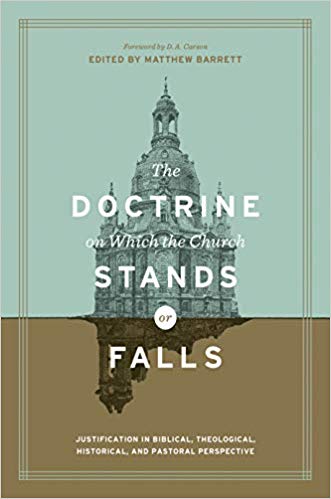A Brief Book Summary from Books at a Glance
By Mark Baker
Editor’s Note: This is a brief summary of Parts 1 and 2 of this book.
Overview of the Book
Johann Heinrich Alsted famously argued that the doctrine of justification by faith alone was the doctrine on which the church stands or falls. This book seeks to provide a comprehensive treatment of this crucial doctrine by providing 26 essays from the disciplines of biblical studies, theology, church history, and pastoral practice.
Table of Contents
Introduction: The Foolishness of Justification
Matthew Barrett
PART 1: JUSTIFICATION IN BIBLICAL PERSPECTIVE
1: “He Believed the Lord”: The Pedigree of Justification in the Pentateuch
Stephen Dempster
2: Singing and Living Justification by Faith Alone: The Psalms and the Wisdom Literature
Allan Harmon
3: Salvation Is the Lord’s: Prophetic Perspectives
Willem A. VanGemeren
4: Setting the Record Straight: Second Temple Judaism and Works Righteousness
Robert J. Cara
5: What Does Justification Have to Do with the Gospels?
Brian Vickers
6: The Righteous God Righteously Righteousness the Unrighteous: Justification according to Romans
Andrew David Naselli
7: By Grace You Have Been Saved Through Faith: Justification in the Pauline Epistles
Brandon Crowe
8: An Epistle of Straw? Reconciling James and Paul
Dan McCartney
9: The New Quest for Paul: A Critique of the New Perspective on Paul
Tim Laato
10: What’s Next? Justification after the New Perspective
David A. Shaw
PART 2: JUSTIFICATION IN THEOLOGICAL PERSPECTIVE
11: “Behold, the Lamb of God”: Theology Proper and the Inseparability of Penal-Substitutionary Atonement from Forensic Justification and Imputation
Stephen J. Wellum
12: Raised for our Justification: The Christological, Covenantal, Forensic, and Eschatological Contours of an Ambiguous Relationship
Matthew Barrett
13: The Theology of Justification by Faith: The Theological Case for Sola Fide
Mark Thomson
14: The Passive and Active Obedience of Christ: Retrieving a Biblical Distinction
Brandon Crowe
15: A Contested Union: Union with Christ and the Justification Debate
David VanDrunen
16: Faith Works: Properly Understanding the Relationship between Justification and Sanctification
- Lucas Stamps
17: Justification, the Law, and the New Covenant
Jason Meyer
Summary
Introduction
The Foolishness of Justification
Matthew Barrett
Understanding justification requires moving from drama to doctrine. We start with the objective and historic work of Christ (historia salutis) and move to the order of salvation (ordo salutis). Justification is grounded in the full work of Christ—a work that is much broader than a legal term like justification. Yet justification does have a special place in our salvation. Luther called it “the first and chief article” of salvation. Calvin called it “the ground on which religion must be supported.” Johann Heinrich Alsted claimed it is “the doctrine on which the church stands or falls” (35). Though there are many skeptics who look at this essential Protestant doctrine and call it “foolishness,” we will gladly embrace this foolishness if it means we can treasure an other-worldly gospel like Christ’s gospel (1 Cor 1:25).
Chapter 1: “He Believed the Lord”: The Pedigree of Justification in the Pentateuch
Stephen Dempster
Paul did not make up the doctrine of justification. In fact, the doctrine has its roots in the Pentateuch. Noah is the first person in the Bible to be called “righteous” (Gen 6:9). In connection with Noah, God made a covenant with all of creation. Here we see that righteousness “is absolutely central to covenant and creation, and without it the created order cannot continue” (46).
Secondly, Genesis 15:6 tells us that Abraham’s faith is reckoned as righteousness. Before God’s call, we can assume that Abraham was unrighteous just like everyone else. Furthermore, “it is extremely significant that as Noah represented the tenth generation from Adam, Abram is the tenth from Noah. Noah’s righteousness saved not the world of his time but only his own family and the animals, but it is said of Abram that through him all the families of the earth will be blessed—not just one” (47).
What is hinted at with Noah is made clear with Abraham. It is faith not works that makes people righteous. This point is probably why Paul cites Genesis 15:6 three times in his letters (Rom 4:3, 22; Gal 3:6). In fact, Genesis 15:6 is so important that one scholar claims that “No other Old Testament text has exercised such a compelling influence on the New Testament” (42). Therefore we can see the unity in the Scriptures as Paul shows more of how the gospel works as illustrated through the life of Abraham.
Chapter 2: Singing and Living Justification by Faith Alone: The Psalms and Wisdom Literature
Allan Harman
The Psalms are especially helpful in our study of justification because this doctrine is not just meant to be agreed with, but to be sung. The Psalms often contrast God’s complete holiness with man’s sinfulness. Yet God blots out our transgressions (Ps 51:1, 9); he washes us and purifies us (Ps 51:2, 7). He gives us new eyes to see his holiness and to praise him for it (Ps 99:3, 5, 9). Luther gave careful attention to justification in the Psalms, focusing on what he called the “Pauline Psalms,” a handful of psalms that inform Pauline themes (Ps 32, 51, 130, 143).
[To continue reading this summary, please see below....]The remainder of this article is premium content. Become a member to continue reading.
Already have an account? Sign In
